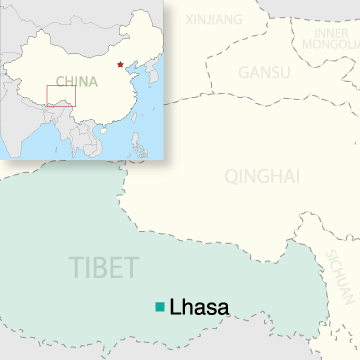




Tibetan political prisoners held at a facility outside the regional capital Lhasa are routinely subjected to torture and other forms of abuse, often leading to physical harm from which they do not recover, a recently released prisoner said.
Harsh treatment is common at the Chushur Prison, located about 48 kilometers (30 miles) southwest of Lhasa, the man told RFA’s Tibetan Service, speaking on condition of anonymity.
“We were tortured every day in the jail,” the man said. “We were sometimes hung from the ceilings, with our hands and legs tied together.”
“They never fed us regularly. But when they did, they mixed sand in our tsampa [roasted barley flour], which induced thirst, and many of us were forced to drink our own urine.”
“Many of us were chained and tortured in the bathrooms,” he added.
Ruined health
Almost all Tibetan prisoners confined at Chushur suffer from impaired vision and other injuries due to torture and beatings, said the man, who was recently released after being taken into custody in late 2009 for taking part in political protests.
“The condition of my own health is not good,” he said.
“My hands are damaged, and both my eyes were badly affected by my long imprisonment in Chushur and the prolonged torture that I endured.”
Chinese interrogators at Chushur repeatedly ask prisoners about what authorities believe to be sources of outside influence on protests in Tibet, the man said.
“They wanted to know who had ‘instigated’ us to protest against the Chinese government.”
“They told us that [Tibet’s exiled spiritual leader] the Dalai Lama would not help us when we needed him, and that it was the [ruling] Chinese Communist Party that could really help us.”
Asked why they had protested, prisoners at Chushur uniformly replied that they had no freedom to practice their religion or to express their views and thoughts, he said.
Torture 'endemic'
Though China is a signatory to the United Nations Convention Against Torture, “torture remains endemic in Chinese prisons,” said Sophie Richardson, China Director at the Washington office of Human Rights Watch.
“It’s a very commonly used tactic either to force people to comply, or simply to torment them, or to elicit further information.”
“There are very few avenues for redress,” Richardson said.
As of Sept. 1, 2012, the U.S. Congressional-Executive Commission on China’s (CECC) Political Prisoner Database contained records of 626 Tibetan political prisoners believed or presumed to be held in Chinese custody.
Of these, 597 were detained on or after March 10, 2008, when Tibetan protests against Chinese rule swept the region, according to the CECC Annual Report for 2012.
Reported by Kunsang Tenzin for RFA’s Tibetan Service. Translated by Karma Dorjee. Written in English with additional reporting by Richard Finney.